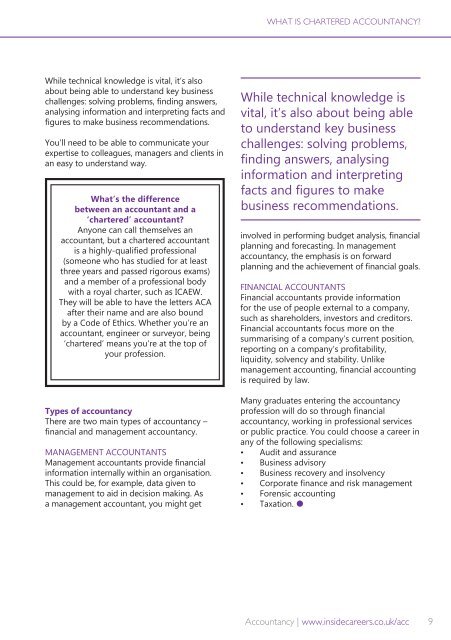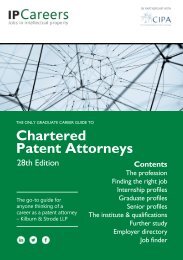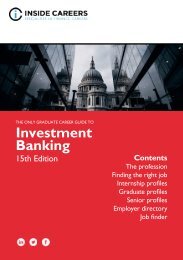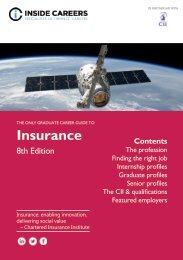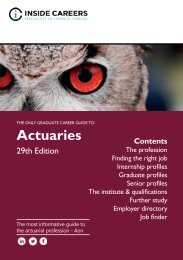Inside Careers Guide to Chartered Accountancy
The only graduate career guide to Chartered Accountancy; published in partnership with ICAEW.
The only graduate career guide to Chartered Accountancy; published in partnership with ICAEW.
You also want an ePaper? Increase the reach of your titles
YUMPU automatically turns print PDFs into web optimized ePapers that Google loves.
WHAT IS CHARTERED ACCOUNTANCY?<br />
While technical knowledge is vital, it’s also<br />
about being able <strong>to</strong> understand key business<br />
challenges: solving problems, finding answers,<br />
analysing information and interpreting facts and<br />
figures <strong>to</strong> make business recommendations.<br />
You’ll need <strong>to</strong> be able <strong>to</strong> communicate your<br />
expertise <strong>to</strong> colleagues, managers and clients in<br />
an easy <strong>to</strong> understand way.<br />
What’s the difference<br />
between an accountant and a<br />
‘chartered’ accountant?<br />
Anyone can call themselves an<br />
accountant, but a chartered accountant<br />
is a highly-qualified professional<br />
(someone who has studied for at least<br />
three years and passed rigorous exams)<br />
and a member of a professional body<br />
with a royal charter, such as ICAEW.<br />
They will be able <strong>to</strong> have the letters ACA<br />
after their name and are also bound<br />
by a Code of Ethics. Whether you’re an<br />
accountant, engineer or surveyor, being<br />
‘chartered’ means you’re at the <strong>to</strong>p of<br />
your profession.<br />
Types of accountancy<br />
There are two main types of accountancy –<br />
financial and management accountancy.<br />
MANAGEMENT ACCOUNTANTS<br />
Management accountants provide financial<br />
information internally within an organisation.<br />
This could be, for example, data given <strong>to</strong><br />
management <strong>to</strong> aid in decision making. As<br />
a management accountant, you might get<br />
While technical knowledge is<br />
vital, it’s also about being able<br />
<strong>to</strong> understand key business<br />
challenges: solving problems,<br />
finding answers, analysing<br />
information and interpreting<br />
facts and figures <strong>to</strong> make<br />
business recommendations.<br />
involved in performing budget analysis, financial<br />
planning and forecasting. In management<br />
accountancy, the emphasis is on forward<br />
planning and the achievement of financial goals.<br />
FINANCIAL ACCOUNTANTS<br />
Financial accountants provide information<br />
for the use of people external <strong>to</strong> a company,<br />
such as shareholders, inves<strong>to</strong>rs and credi<strong>to</strong>rs.<br />
Financial accountants focus more on the<br />
summarising of a company’s current position,<br />
reporting on a company’s profitability,<br />
liquidity, solvency and stability. Unlike<br />
management accounting, financial accounting<br />
is required by law.<br />
Many graduates entering the accountancy<br />
profession will do so through financial<br />
accountancy, working in professional services<br />
or public practice. You could choose a career in<br />
any of the following specialisms:<br />
• Audit and assurance<br />
• Business advisory<br />
• Business recovery and insolvency<br />
• Corporate finance and risk management<br />
• Forensic accounting<br />
• Taxation. •<br />
<strong>Accountancy</strong> | www.insidecareers.co.uk/acc<br />
9


